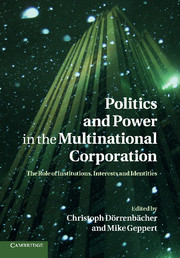 Politics and Power in the Multinational Corporation
Politics and Power in the Multinational Corporation Published online by Cambridge University Press: 26 April 2011
Introduction
While there is quite an extensive literature addressing the issue of individual and organizational identity construction (Alvesson 1994; Phillips and Hardy 1997; Sveningsson and Alvesson 2003; Thomas and Linstead 2002), we still know relatively little about the process of how organizational actors construct their national identities in the MNC context. The dominant view presents national identity as the collective programming of people's minds (Hofstede 1980, 1991). Lacking an agreement as to how to define “culture” (Roberts and Boyacigiller 1984), this view tends to categorize the behavioral patterns of individuals based on a limited set of continuums, e.g. collectivism–individualism, high context–low context, masculinity–femininity, etc. Such conceptualizations represent very static (Tayeb 1994), minimal (McSweeney 2002) and essentialist (Ailon-Souday and Kunda 2003; Barinaga 2007) views on national identity that try to fit it into the predetermined categorizations and fail to take into account the subjectivity and agency of organizational actors in choosing and defining “who they are” (see also chapter of Blazejewski and Becker-Ritterspach in this volume).
This chapter posits that nationalism and national identity provide an important set of discourses that are used to make sense of, to legitimize and to normalize various important issues in MNCs. The national identity construction process is far from being an objective and rational one and national identity per se cannot be viewed as static, given or taken-for-granted (Ailon-Souday and Kunda 2003; Barinaga 2007).
To save this book to your Kindle, first ensure [email protected] is added to your Approved Personal Document E-mail List under your Personal Document Settings on the Manage Your Content and Devices page of your Amazon account. Then enter the ‘name’ part of your Kindle email address below. Find out more about saving to your Kindle.
Note you can select to save to either the @free.kindle.com or @kindle.com variations. ‘@free.kindle.com’ emails are free but can only be saved to your device when it is connected to wi-fi. ‘@kindle.com’ emails can be delivered even when you are not connected to wi-fi, but note that service fees apply.
Find out more about the Kindle Personal Document Service.
To save content items to your account, please confirm that you agree to abide by our usage policies. If this is the first time you use this feature, you will be asked to authorise Cambridge Core to connect with your account. Find out more about saving content to Dropbox.
To save content items to your account, please confirm that you agree to abide by our usage policies. If this is the first time you use this feature, you will be asked to authorise Cambridge Core to connect with your account. Find out more about saving content to Google Drive.